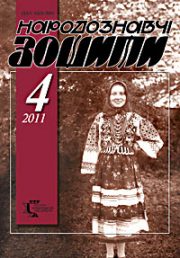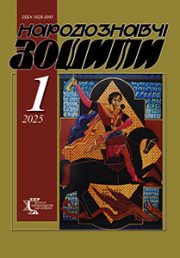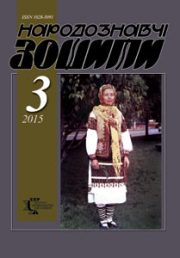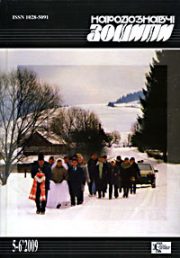The Ethnology Notebooks. 2025. № 2 (182), 397—409
UDK [327.2.015.5:37]((470+571):477)
DOI https://doi.org/10.15407/nz2025.02.397
BARAN Zoya
- ORCID ID: https:// orcid.org/0000-0001-9685-3953
- Candidate of History, Associate Professor,
- Ivan Franko National University of Lviv,
- Department of World Modern History,
- Universytetska str. 1, 79000, Lviv, Ukraine,
- Contacts: е-mail: zoja_baran@ukr.net
POLESHCHUK Tamara
- ORCID ID: https://orcid.org/0000-0002-8802-0633
- Candidate of History, Associate Professor,
- Ivan Franko National University of Lviv,
- Department of Central and Eastern Europe History,
- Universytetska str. 1, 79000, Lviv, Ukraine,
- Contacts: е-mail:tpol@ukr.net
SIROMSKYI Ruslan
- ORCID ID: https://orcid.org/0000-0002-6744-6379
- Doctor of Historical Sciences, Professor,
- Ivan Franko National University of Lviv,
- Department of World Modern History,
- Universytetska str. 1, 79000, Lviv, Ukraine,
- Contacts: e-mail: sir.ruslan@yahoo.com
Abstract. The concept of Russkiy mir has no definitive interpretation: the most common view is that it is a special civilisation whose fundamental principles are based on the Russian language and culture, Orthodoxy, common history and historical memory. Russkiy mir has become the ideological basis of an authoritarian political regime and an important factor in Putin’s geopolitics. History and historical memory has become one of the most powerful tools for establishing Russkiy mir. The purpose of the research is to outline the impact of Russkiy mir ideology on the content of the historical narrative and the school course of history in modern Russia. The methodological basis of the article is the principles of historicism, determinism and systematicity, which, when applied to historical and typological and comparative historical methods, allow us to analyse the content of Russkiy mir ideology and its impact on the content of history textbooks for schools in modern Russia.
Results. The year 2013 should be considered as a turning point in terms of accelerating the ideological unification of history teaching in Russian schools. The basic constructs of Russkiy mir have been implemented in Russian curriculum and history textbooks during the full-scale war against Ukraine. The Russian historical narrative presents Ukraine as an «artificially created pseudo-state», a «temporarily detached part of Russian territory», whose people are part of the Russian people, dreaming of reunification, suffering under the rule of «Nazis and Banderites». Conclusion. The Russian historical narrative contributes to the formation of a distorted image of Ukraine and Ukrainians among students; it justifies Russia’s territorial claims to the state of Ukraine. During the full-scale war, Russia’s centuries-old imperial expansionism and the true nature of its attitude towards Ukraine in the optics of Russkiy mir became apparent: Ukrainophobia, ethnocide, abuse and contempt for Ukrainians.
Keywords: Russkiy mir, state ideology, geopolitics, the Russian-Ukrainian war, historical memory, history teaching in schools.
Received 24.03.2025
REFERENCES
- Plokhii, S. (2019). The Lost Kingdom. History of the «Russian World» from 1470 to the present day. Kharkiv: Folio [in Ukrainian].
- Laruelle, M. (2015). The «Russian World». Russia’s Soft Power and Geopolitical Imagination. Washington: Centre on Global Interests.
- Yakubova, L. (2018). The «Russian World» in Ukraine: on the Edge of the Abyss. Kyiv: Clio [in Ukrainian].
- Yakubova, L. (2020). Eurasian rift. Ukraine in the Age of Hybrid Challenges. Kyiv: Clio Publishing House [in Ukrainian].
- Yakubova, L. (2023). To freedom through fire: Ukraine against racism. Kyiv: Clio Publishing House [in Ukrainian].
- Yakubova, L. (2023). Rashism: The Beast from the Abyss. Kyiv: Akademperiodyka [in Ukrainian].
- Kasyanov, G., Smolii, V., & Tolochko, O. (2013). Ukraine in the Russian Historical Discourse: Problems of Research and Interpretation. Kyiv: National Academy of Sciences of Ukraine; Institute of History of Ukraine [in Ukrainian].
- Baturina, S. (2011). To the Question of the Presentation of Ukrainian History in the Didactic Literature of the Russian Federation. Historiographical Studies in Ukraine, 21, 315—334 [in Ukrainian].
- Baturina, S. (2016). Ukrainian History in Modern Russian History Textbooks (2009—2015). Historiographical Studies in Ukraine, 26, 468—482 [in Ukrainian].
- Turchenko, F. (2013). «General History»: Science or Politics? Culture of Historical Memory: European and Ukrainian Experience (Рp. 414—446).Kyiv: National Academy of Sciences of Ukraine; I. Kuras Institute of Political and Ethnic Studies [in Ukrainian].
- Yaremchuk, V. (2023). Ukraine in the school history of Putin’s Russia (until 2021). Ukrainian Historical Journal, 3 (570), 176—196 [in Ukrainian].
- Yaremchuk, V., & Smirnov, A. (2023). Analytical review «The History of Ukraine in Russian School History Textbooks». Kyiv [in Ukrainian].
- Smolii, V. (Ed.). (2023). Russian history textbooks: a school of hatred and enmity. Kyiv: National Academy of Sciences of Ukraine; Institute of History of Ukraine; National Academy of Pedagogical Sciences of Ukraine; Institute of Pedagogy [in Ukrainian].
- Gudz, V., Polyakova, L., & Krylova, A. (2023). School history textbooks in Putin’s Russia as a means of information warfare with Ukraine. Problems of Humanities: Collection of scientific works of Drohobych Ivan Franko State Pedagogical University, History Series, 14 (56), 173—184. DOI: https://doi.org/10.24919/2312-2595.14/56.19 [in Ukrainian].
- Dolutskyi, I. (2002). National history. XX century: textbook for 10—11 grades of general education institutions: in two parts (Part 2). Moscow: Mnemozina [in Russian].
- Sveshnikov, A. (2004). Struggle around school history textbooks in post-Soviet Russia: main trends and results. Journal Hall. Retrieved from: https://magazines.gorky.media/nz/2004/4/borba-vokrug-shkolnyh-uchebnikov-istorii-v-postsovetskoj-rossii-osnovnye-tendenczii-i-rezultaty.html) [in Russian].
- (2003). «Putin: School textbooks are not a platform for political struggle, history «must be stripped of all husks and foam». Putin’s meeting with historians at the Russian State Library. 27.11.2003. Retrieved from: https://www.newsru.com/russia/27nov2003/pres.html [in Russian].
- (2007). Stenographic report on the meeting with delegates of the All-Russian Conference of Teachers of Humanities and Social Sciences, President of Russia. Official website. 21.06.2007. Novo Ogarevo. Retrieved from: http://archive.kremlin.ru/text/appears/2007/06/135323.shtml [in Russian].
- Filippov, A. (2007). The New History of Russia, 1945—2006: a book for teacher. Moscow: Prosveshchenie [in Russian].
- Miller, A. (2012). Historical policy in Russia: a new turn? Historical policy in the XXI century. Collection of articles (Рp. 328—367). Moscow: NLO [in Russian].
- Danilov, A., Utkin, A., & Filippov, A. (Eds.). (2007). History of Russia. 1945—2007: Textbook for 11th grade. Moscow: Prosveshchenie [in Russian].
- Danilov, A., Utkin, A., & Filippov, A. (Eds.). (2009). History of Russia. 1945—2008: Textbook for 11th grade. Moscow: Prosveshchenie [in Russian].
- Danilov, A. (2008). History of Russia. 1900—1945. Methodological manual. 11th grade. Moscow: Prosveshchenie [in Russian].
- Gyrych, I. (2013). Ukrainian Historical Memory, School Textbooks and Education. Culture of Historical Memory: European and Ukrainian Experience (Рp. 326—391). Kyiv: National Academy of Sciences of Ukraine; I.F. Kuras Institute of Political and Ethnic Studies [in Ukrainian].
- Samyhin, S., & Tumaikin, I. (2014). Unified history textbook as an element of the national identity system. State and Municipal Administration. SCAGS Scientific Notes, 4. URL: https://cyberleninka.ru/article/n/edinyy-uchebnik-istorii-kak-element-sistemy-natsionalnoy-identichnosti/viewer [in Russian].
- (2009, 15.05). «On the Commission under the President of the Russian Federation to counter attempts to falsify history to the detriment of Russia’s interests». Decree of the President of the Russian Federation, 549. URL: https://web.archive.org/web/20090523093807/http://document.kremlin.ru/doc.asp?ID=052421 [in Russian].
- Bomsdorf, F., & Bordyugov, G. (2003). Russia and the Baltic States, Central and Eastern Europe, South Caucasus and Central Asia: Old and New Images in Modern History Textbooks. Scientific Reports and Messages. Moscow: AIRO-XXI [in Russian].
- Danilov, A., & Filippov, A. (Eds.). (2009). Coverage of the Common History of Russia and Post-Soviet Countries in School Textbooks of History of New Independent States. Moscow [in Russian].
- Yakunin, V. (Ed.). (2009). The ideology of school history textbooks in the post-Soviet space: anti-Russian consolidation. School History Textbooks and State Policy (Pp. 227—308). Moscow [in Russian].
- Danilov, A., & Filippov, A. (Eds.). (2010). History of Russia and the New Independent States in school textbooks: a book for teacher. Moscow [in Russian].
- (2010). Baltic and Central Asia as part of the Russian Empire and the USSR: myths of modern textbooks of post-Soviet countries and the reality of socio-economic calculations. Moscow [in Russian].
- (2012). «I will tell you about the war»: World War II and the Great Patriotic War in textbooks and consciousness of schoolchildren of Slavic countries. Moscow [in Russian].
- (2010, 29.03). «Tabachnik was complained to about «shalenu derusyfikatsiju» osvity». Zahid.net. Retrieved from: https://zaxid.net/tabachniku_poskarzhilisya_na_laquoshalenu_derusifikatsiyuraquo_osviti_n1099420 [in Ukrainian].
- (2012, 09.01). «On Holding the Year of Russian History in the Russian Federation». Presidential Decree. Retrieved from: http://kremlin.ru/acts/bank/34627 [in Russian].
- Russian Historical Society, Official website. Retrieved from: https://historyrussia.org/ [in Russian].
- Russian Military Historical Society. Official website. Retrieved from: https://rvio.histrf.ru/ [in Russian].
- (2012, 29.12). Federal Law «On Education in the Russian Federation» (latest version), 273-FZ. Retrieved from: https://www.consultant.ru/document/cons_doc_LAW_140174/ [in Russian].
- (2013). Concept of a New Educational and Methodological Complex on Patriotic History. Retrieved from: https://historyrussia.org/images/documents/konsepsiyafinal.pdf [in Russian].
- (2013, 19.02). «Russia will write a new history textbook». Retrieved from: https://dni.ru/polit/2013/2/19/248476.html [in Russian].
- (2013, 29.03). «Putin urged to create a single «canonical» history textbook». Ntv.ru.novosti. Retrieved from: www.ntv.ru/novosti/536176/#ixzz2Oxnjl78F [in Russian].
- (2013, 17.03). «Education Minister promised to show a unified history textbook in a year». Polit.ru.news. Retrieved from: http://polit.ru/news/2013/03/17/edinyj/ [in Russian].
- (2013, 20.02). «President instructed to prepare new unified history textbooks». RGRU. Retrieved from: https://rg.ru/2013/02/21/istoriya.html [in Russian].
- (2014, 22.05). «Appeal to historians — authors of school textbooks». Polit.ru. Retrieved from: https://polit.ru/article/2014/05/22/history/ [in Russian].
- (2012, 14.09). «Ukraine and Russia have created a joint textbook on history». LB.ua. Retrieved from: https://lb.ua/society/2012/09/14/170570_ukraina_rossiya_sozdali_obshchiy.html [in Russian].
- Kochegarov, K. (2014). Crimea in the history of Russia: methodical manual for teachers of general educational organisations. Moscow: «Russian word — textbook» [in Russian].
- (2017). Concept of a New Educational and Methodological Complex on Patriotic History. Retrieved from: https://historyrussia.org/images/documents/konsepsiyafinal.pdf [in Russian].
- Malkin, S. (2021). Historical and cultural standard and professional training of a teacher in the formation of civil identity (problem statement). Samara Scientific Bulletin, 3 (Vol. 10, pp. 265—268). Retrieved from: https://cyberleninka.ru/article/n/istoriko-kulturnyy-standart-i-professionalnaya-podgotovka-pedagoga-v-formirovanii-grazhdanskoy-identichnosti-postanovka-problemy/viewer [in Russian].
- (2020, 23.10). Concept of teaching the course «History of Russia» in educational organisations of the Russian Federation implementing basic general education programmes, Ministry of Education of the Russian Federation, PK-1vn. Retrieved from: https://historyrussia.org/sobytiya/podgotovlen-proekt-usovershenstvovannoj-kontseptsii-prepodavaniya-uchebnogo-kursa-istoriya-rossii.html [in Russian].
- Barkar, D., & Gulatkan, S. (2023). Automatic order with school textbooks. How the Russian policy of children’s militarisation violates international law. Institute of Mass Information. Retrieved from: https://imi.org.ua/monitorings/avtomaty-poryad-z-shkilnymy-pidruchnykamy-yak-rosijska-polityka-militaryzatsiyi-ditej-porushuye-i51926 [in Ukrainian].
- Putin, V. (2021). About the historical unity of Russians and Ukrainians. Retrieved from: http://kremlin.ru/events/president/news/66182 [in Ukrainian].
- (2021, 30.07). «On the Interdepartmental Commission on Historical Education», Decree of the President of the Russian Federation, 442. Retrieved from: http://www.kremlin.ru/acts/bank/47084http://publication.pravo.gov.ru/Document/View/00 [in Russian].
- (2022). All-Russian Scientific Conference «Scientific and Educational Conference on the Problems of Worldview and Social Sciences «DNA of Russia», 25 (31). Retrieved from: https://znanierussia.ru/events/nauchno-prosvetitelskaya-konferenciya-po-problemam-mirovozzreniy-878 [in Russian].
- Artizov, Andrei (Ed.). (2023). On the Historical Unity of Russians and Ukrainians: Documents. Moscow: Svіyaz Epokh Foundation [in Russian].
- (2022). History. Federal list of textbooks. Retrieved from: https://events.prosv.ru/uploads/2023/02/additions/sFFmO96jvT3Jb9iWMKwBT2rdarGi5t3FHunwR1ab.pdf [in Russian].
- Medynsky, V., & Torkunov, A. (2023). History of Russia. 1945 — the beginning of the XXI century. Uch. 11th grade. Basic level. Moscow: Prosveshchenie [in Russian].
- (2023). Genocidal rhetoric of the Russian regime. Kyiv: Centre for Strategic Communications and Information Security [in Russian].
- (2024). «On Approval of the Fundamentals of the State Policy of the Russian Federation in the Field of Historical Education», Decree of the President of the Russian Federation, 314. Retrieved from: http://www.kremlin.ru/acts/bank/50534 [in Russian].







